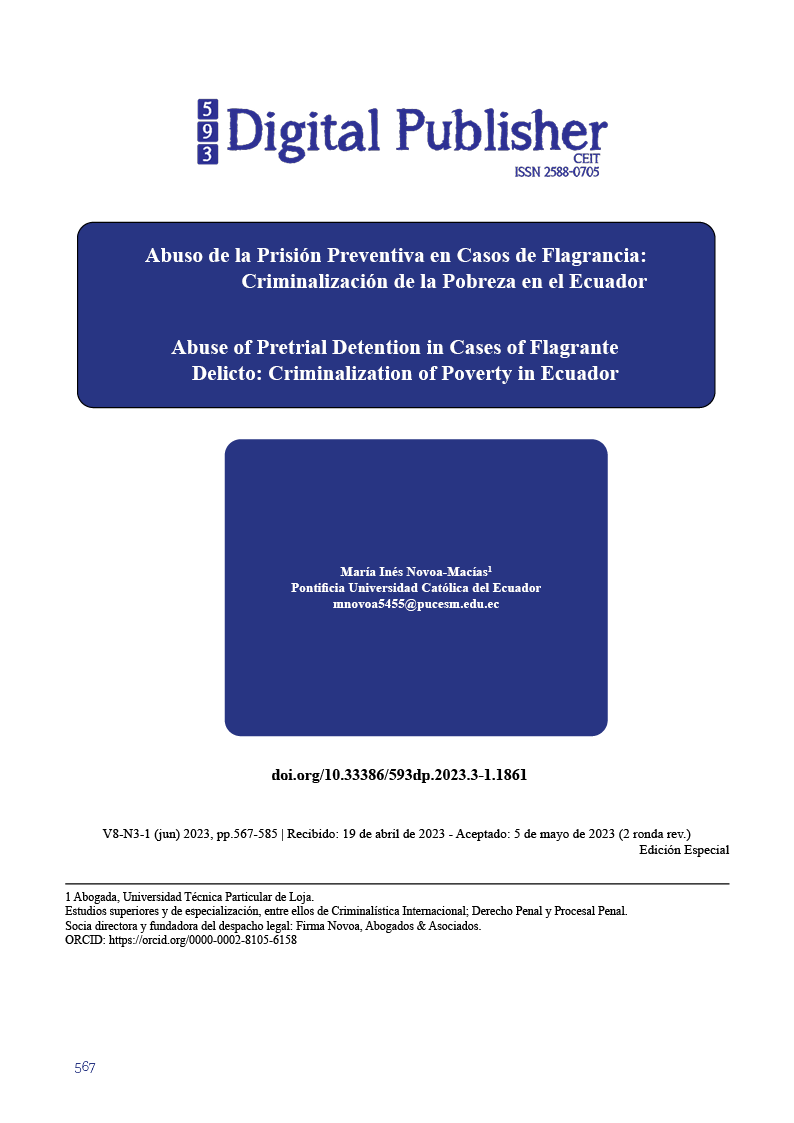Abuse of Pretrial Detention in Cases of Flagrante Delicto: Criminalization of Poverty in Ecuador
Main Article Content
Abstract
This article suggests a critique of the abuse of pretrial detention, with respect to the commission of a rare crime or of little social significance, or the analysis of the execution of a short sentence with a preventive detention order, which is costlier for the State, rather than making the decision of an extrajudicial reparation, or resolve with non-custodial sanctions, alternative to prison.
Freedom is the general rule, which can only be exceptionally and motivatedly restricted, especially if it is too serious a crime. But it is the responsibility of the State to take care of this freedom, fundamental rights and constitutional guarantees that protect not only the victim but the offender. The order of preventive detention must be adjusted to the reality of the accused, especially when there are other precautionary measures that do not deprive him of his right to liberty, in this way his situation as a defendant is avoided, just to respond to an equivocal interest of security and supposed justice that society demands.
Ecuador's Comprehensive Criminal Code lacks justice and reasonableness. The system has allowed itself to be carried away by customary work and not by what the norm expressly mandates and prohibits. The result of this is prison overcrowding, for crimes less serious than those carried out by members of the government, who affect not only the direct victim of a specific crime, but the entire Ecuadorian people. But it is still more important to prosecute lighter crimes, and order custodial sentences to disguise "justice" in front of the society that cries out for jail, while the great crimes are being absorbed by the forgetfulness of Ecuador's judges, and by the same cycle of corruption due to punitive populism, which result not only in prison crisis. but more criminalization of poverty.
Downloads
Article Details

This work is licensed under a Creative Commons Attribution-NonCommercial-ShareAlike 4.0 International License.
1. Derechos de autor
Las obras que se publican en 593 Digital Publisher CEIT están sujetas a los siguientes términos:
1.1. 593 Digital Publisher CEIT, conserva los derechos patrimoniales (copyright) de las obras publicadas, favorece y permite la reutilización de las mismas bajo la licencia Licencia Creative Commons 4.0 de Reconocimiento-NoComercial-CompartirIgual 4.0, por lo cual se pueden copiar, usar, difundir, transmitir y exponer públicamente, siempre que:
1.1.a. Se cite la autoría y fuente original de su publicación (revista, editorial, URL).
1.1.b. No se usen para fines comerciales u onerosos.
1.1.c. Se mencione la existencia y especificaciones de esta licencia de uso.
References
Carrión Intriago, F. (2019). Defensoría del Pueblo del Ecuador acudirá ante la Función Judicial para tratar la grave situación de hacinamiento, violencia y falta de medios de vida del Sistema de Rehabilitación Social del país. Defensoría del Pueblo.
Código Orgánico Integral Penal, COIP. (2014). Suplemento 180.
Constitución de la República del Ecuador. (2008). Registro Oficial 449. Asamblea Constituyente.
Corte Interamericana de Derechos Humanos. (2004). Caso Tibi Vs Ecuador, sentencia del 07 de septiembre de 2004 punto 106.
Corte Nacional de Justicia. (2022). Resolución 04-2022.
Galarza Castro, C. X., & Córdova Vinueza, P. (2021). Modelo de MacCormick como esquema de motivación para la aplicación de los estándares de la CIDH en la fijación de la prisión preventiva (Vol. 14). Revista Ciencia UNEMI. Obtenido de https://doi.org/10.29076/issn.2528-7737vol14iss37.2021pp1-14p
Gómez, A. (2014). Populismo penal o falta de creatividad. URVIO Revista Latinoamericana de Estudios de Seguridad.
González Malla, J. P., & Armijos Campoverde, H. A. (2021). La crisis penitenciaria en Ecuador: ¿Un mal sin remedio? AXIOMA Revista Científica de Investigación, Docencia y Proyección Social.
Krauth, S. (2018). La prisión preventiva en el Ecuador (Vol. 8). Defensoría Pública del Ecuador, Serie Justicia y Defensa.
Lasso Mendoza, G. (2021). Decreto ejecutivo 264. Presidencia de la República del Ecuador.
Lasso Mendoza, G. (2021). Decreto ejecutivo 265. Presidencia de la República del Ecuador.
Lasso Mendoza, G. (2022). Decreto ejecutivo 355. Presidencia de la República del Ecuador.
Lozano Bedoya, C. A. (2013). Repositorio Defensoría del Pueblo.
Moncayo, E. E. (2020). Resolución SNAI-SNAI-2020-0031-R. Servicio Nacional de Atención Integral a Personas Adultas Privadas de la Libertad y a Adolescentes Infractores.
Pacto Internacional de Derechos Civiles y Políticos. (s.f.). Ediciones Legales. Obtenido de http://www.pastaza.gob.ec/baselegal/pacto_internacional_de%20derechos_civiles_y_politicos.pdf
Pérez Cobo, G., Suárez Vásquez, H. D., & Pastaz Pastaz, F. W. (2022). La criminalización del procesado ante la aplicación de la medida cautelar de prisión preventiva. Revista San Gregorio.
Pérez Pinzón, Á. O. (2004). Los principios generales del proceso penal. Universidad Externado de Colombia.
Pleno del Consejo de la Judicatura. (2020). Resolución 048-2020.
Programa de las Naciones Unidas para el Desarrollo. (2013). Seguridad Ciudadana, Prevención de crisis y recuperación.
Yépez Tapia, A. (2002). La investigación científica en Derecho. Publicaciones de Legislación.


